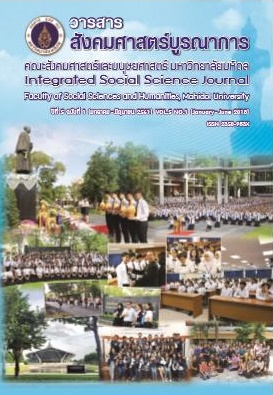การพัฒนาพฤติกรรมเอื้อต่อสังคมของนักศึกษาระดับปริญญาตรี โดยใช้เพลงที่มีเนื้ อหาเอื้อต่อสังคม: กรณีศึกษาคณะมนุษยศาสตร์และสังคมศาสตร์ มหาวิทยาลัยเทคโนโลยีราชมงคลตะวันออก
Main Article Content
บทคัดย่อ
การวิจัยนี้มีวัตุประสงค์เพื่อ ศึกษาผลของการพัฒนาพฤติกรรมเอื้อต่อสังคมของนักศึกษาระดับปริญญาตรีด้วยเพลงที่มีเนื้อหาเอื้อต่อสังคม กลุ่มตัวอย่างคือนักศึกษาระดับปริญญาตรี คณะมนุษยศาสตร์และสังคมศาสตร์ มหาวิทยาลัยเทคโนโลยีราชมงคลตะวันออก ปีการศึกษา 2559 ที่มีผลคะแนน จากมาตรวัดพฤติกรรมเอื้อต่อสังคม อยู่ในระดับต่ำ และอาสาสมัครเข้าร่วมการทดลอง จำนวน 30 คน สุ่มออกเป็นสองกลุ่ม คือ กลุ่มทดลอง จำนวน 15 คน และกลุ่มควบคุม จำนวน 15 คน ในกลุ่มทดลองได้รับการฟังเพลงที่มีเนื้อหาเอื้อต่อสังคม จำนวน 10 ครั้ง ครั้งละ 30 นาที สัปดาห์ละ 2 ครั้ง ต่อเนื่องเป็นระยะเวลา 5 สัปดาห์ ส่วนกลุ่มควบคุมไม่ได้รับการฟังเพลง เก็บรวบรวมข้อมูลโดยการวัดผล 3 ระยะ ได้แก่ ระยะก่อนการทดลอง ระยะหลังการทดลอง และระยะติดตามผล วิเคราะห์ข้อมูลด้วยวิธีหาค่าเฉลี่ย ส่วนเบี่ยงเบนมาตรฐาน และสถิติทดสอบที
ผลการวิจัยปรากฏว่า กลุ่มทดลองมีคะแนนพฤติกรรมเอื้อต่อสังคม ในระยะหลังการทดลองและระยะติดตามผล สูงกว่ากลุ่มควบคุม อย่างมีนัยสำคัญทางสถิติที่ระดับ .05 และกลุ่มทดลองมีคะแนนพฤติกรรมเอื้อต่อสังคมในระยะหลังการทดลอง และระยะติดตามผล สูงกว่าระยะก่อนการทดลองอย่าง
มีนัยสำคัญทางสถิติที่ระดับ .05
Article Details
- วารสารสังคมศาสตร์บูรณาการ มหาวิทยาลัยมหิดล อนุญาตให้สามารถนำไฟล์บทความไปใช้ประโยชน์และเผยแพร่ต่อได้ โดยอยู่ภายใต้เงื่อนไขสัญญาอนุญาต CC Attribution-NonCommercial-NoDerivatives 4.0 International (CC BY-NC-ND 4.0) โดยต้องแสดงที่มา/การอ้างอิงจากวารสาร – ไม่ใช้เพื่อการค้า – ห้ามแก้ไขดัดแปลงเนื้อหา
- ข้อความที่ปรากฏในบทความในวารสารฯ เป็นความคิดเห็นส่วนตัวของผู้เขียนแต่ละท่าน ไม่เกี่ยวข้องกับกองบรรณาธิการวารสารฯ (ซึ่งหมายรวมถึง บรรณาธิการ ผู้ทรงคุณวุฒิในกองบรรณาธิการ หรือ บรรณาธิการรับเชิญ) แต่อย่างใด ความรับผิดชอบองค์ประกอบทั้งหมดของบทความแต่ละเรื่องเป็นของผู้เขียนแต่ละท่าน หากมีความผิดพลาดใด ๆ ผู้เขียนแต่ละท่านจะรับผิดชอบบทความของตนเอง ตลอดจนความรับผิดชอบด้านเนื้อหาและการตรวจร่างบทความเป็นของผู้เขียน ไม่เกี่ยวข้องกับกองบรรณาธิการวารสารฯ
- กองบรรณาธิการขอสงวนสิทธิ์ในการตัดทอน/ปรับแก้ถ้อยคำบางประการเพื่อความเหมาะสม
เอกสารอ้างอิง
(2 ed.). Belmont, CA: Wadsworth.
Baumgarten, H. R., & Wheeler, B. L. (2016). The Effects of Music Therapy on the Prosocial Behaviors of Adults with Disabilities. Music and Medicine, 8(3), 118-127.
Cirelli, L. K. (2018). How interpersonal synchrony facilitates early prosocial behavior. Current opinion in psychology, 20(1), 35-39.
Clark, S. S., & Giacomantonio, S. G. (2013). Music preferences and empathy: Toward predicting prosocial behavior. Psychomusicology: Music, Mind, and Brain, 23(3), 177-186.
Daykin, N., De Viggiani, N., Pilkington, P., & Moriarty, Y. (2012). Music making for health, well-being and behaviour change in youth justice settings: a systematic review. Health promotion international, 28(2), 197-210.
Dovidio, J. F., Piliavin, J. A., Schroeder, D. A., & Penner, L. A. (2017). The social psychology of prosocial behavior. Psychology Press.
Dumont, E., Syurina, E. V., Feron, F. J., & van Hooren, S. (2017). Music Interventions and Child Development: A Critical Review and Further Directions. Frontiers in psychology, 8: 1694(1), 1-20.
Edmonds, W. A., & Kennedy, T. (2017). An applied guide to research designs, SAGE Publications.
Eerola, P. S., & Eerola, T. (2014). Extended music education enhances the quality of school life. Music education research, 16(1), 88-104.
Eisenberg, N., Spinrad, T. L., & Knafo-Noam, A. (2015). Prosocial development. In: Lamb ME, ed. Handbook of child psychology and developmental science.
(7th ed.). Hoboken, NJ: Wiley, 610-656.
Gross, J. T., Stern, J. A., Brett, B. E., & Cassidy, J. (2017). The multifaceted nature of prosocial behavior in children: Links with attachment theory and research. Social Development, 26(1), 661-678.
Kapse, P. P., & Nirmala, B. P. (2015). Efficacy of Social Skills Training among Persons with Schizophrenia. International Journal of Psychosocial Rehabilitation, 20(1),
45-50.
Kniffin, K. M., Yan, J., Wansink, B., & Schulze, W. D. (2017). The sound of cooperation: Musical influences on cooperative behavior. Journal of organizational behavior, 38(3), 372-390.
Krahe, B., & Busching, R. (2015). Breaking the vicious cycle of media violence use and aggression: A test of intervention effects over 30 months. Psychology of Violence, 5(2), 217-226.
Leme, V. B. R., Fernandes, L. D. M., Jovarini, N. V., Achkar, A. M. E., & Del Prette, Z. A. P. (2016). Social Skills Program for Adolescents in Vulnerable Social Contexts. Psico-USF, 21(3), 595-608.
Mares, M. L., & Woodard, E. H. (2012). Effects of prosocial media content on children’s social interactions. Handbook of children and media. 2nd edition. Thousand Oaks (CA): Sage, 197-214.
Maury, S., & Rickard, N. (2016). Well-being in the classroom: How an evolutionary perspective on human musicality can inform music education. Australian Journal of Music Education, 50(1), 3-15.
McVey, A. J., Dolan, B. K., Willar, K. S., Pleiss, S., Karst, J. S., Casnar, C. L., & Van Hecke, A. V. (2016). A replication and extension of the PEERS® for young adult’s social skills intervention: Examining effects on social skills and social anxiety in young adults with autism spectrum disorder. Journal of autism and developmental disorders, 46(12), 3739-3754.
Myers, D. G. (2012) Social Psychology. (10 ed.). New York, NY: McGraw-Hill Companies.
Niven, K. (2015). Can music with prosocial lyrics heal the working world? A field intervention in a call center. Journal of applied social psychology, 45(3), 132-138.
Padilla-Walker, L. M., & Carlo, G. (Eds.). (2015). Prosocial development: A multidimensional approach. Oxford University Press.
Prot, S., Gentile, D. A., Anderson, C. A., Suzuki, K., Swing, E., Lim, K. M., & Liau, A. K. (2014). Long-term relations among prosocial-media use, empathy, and prosocial behavior. Psychological science, 25(2), 358-368.
Ruth, N. (2017). “They don’t really care…”: Effects of music with prosocial content and corresponding media coverage on prosocial behavior. Musicae Scientiae, 1029864917716735.
Schellenberg, E. G., Corrigall, K. A., Dys, S. P., & Malti, T. (2015). Group music training and children's prosocial skills. PLoS One, 10(10), e0141449.
Vesperini, S., Askenazy, F., Renaudo, N., Staccini, P., Hun, S., Legall, E., & Serret, S. (2015). Prosocial intervention in children and adolescents with autism spectrum disorder without intellectual disability: benefits of videotaping therapy sessions. L'Encephale, 41(1), 47-55.


